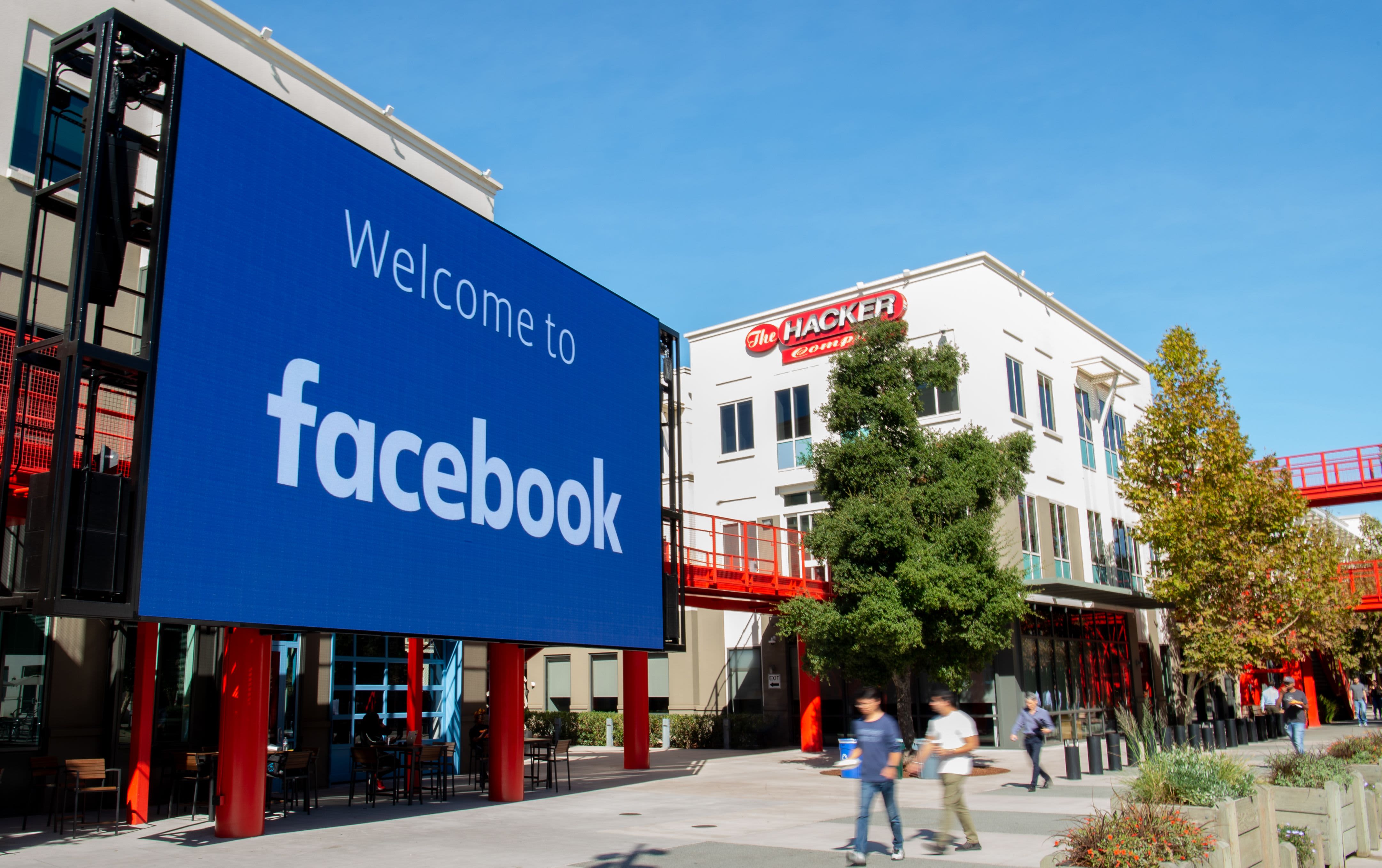Facebook makes some contractors come into offices despite delaying return for U.S. employees

A giant digital sign is seen at Facebook’s corporate headquarters campus in Menlo Park, California, on October 23, 2019.
Josh Edelson | AFP | Getty Images
When Michelle Moran read that Facebook would be delaying its employees’ office return until 2022, she broke into tears.
That’s because Moran, a contractor for Facebook through staffing firm Accenture, has experienced quite the opposite in her dealings with the company.
While U.S. Facebook employees have been spared risking their health in the wake of the Covid-19 delta wave until a return to office occurs in January 2022, Moran’s team of contractors has not. They’ve been back in Facebook’s offices since Aug. 2, and their in-person attendance is required until further notice.
The situation is the latest example of how tech employees are treated in comparison to contractors who work in the industry. Reports have shown that while full-time tech employees enjoy high-paying salaries, company stock and bask in cushy perks and benefits, tech contractors are often treated as second-class citizens making less money, have less time off and do not have as many perks or benefits.
While Facebook has taken steps to protect its U.S. employees by allowing them to continue working remotely for at least another several months, that same consideration has not been extended to the contractors on Moran’s team.
“It’s a really sad situation where the poor again are treated with discrimination,” she said.
A Facebook spokeswoman confirmed that the company does have some employees and contractors back at its offices.
“While the majority of full-time employees and contingent workers for Facebook continue working from home, some have returned to offices that have reopened at reduced capacities with strict health and safety standards in place,” the spokeswoman said in a statement. “A person’s status as a full-time employee or a contingent worker does not factor into whether or not they can work from home due to the global pandemic.”
The Facebook spokesperson declined to say how many contractors in the U.S. are required to work in the company’s offices.
Moran is on a team of approximately 18 Accenture contractors who generate data for Facebook’s machine-learning models. The team had been working remotely for more than a year when they were informed on July 15 that they’d be needed back at Facebook’s Mountain View, Calif. offices.
The contractors were given two weeks to prepare for the return. The workers would need to receive a note from a doctor excusing them from the office return or come back. The contractors were told that if they needed more time, they would need to dip into their 10 days of personal-time off or not get paid, Moran said.
Fortunately for her, Moran was able to get a doctor to sign a form saying she lives with someone who is vulnerable to Covid-19, her elderly mom, and she has been given permission to continue working remotely until Aug. 31.
While Facebook has told its full-time U.S. employees they do not need to return to the office until January 2022, Accenture contractor Michelle Moran is on a team that was asked to return to Facebook’s offices this month.
Courtesy of Michelle Moran
But Moran notes that of her entire team, only she and two of her colleagues were able to get these excused remote work permissions. Others on her team, including a pregnant colleague and another colleague who is more than 60 years old, have had to continue going into the office, even as delta cases surge.
In a statement, Accenture said the company prioritizes the safety and wellbeing of its employees through social distancing, enhanced office cleanings, mask requirements, regular Covid testing and individual transportation to and from the office.
“We work collaboratively with our people on individual accommodations, including work from home, in compliance with all applicable employment laws and local regulations,” a spokeswoman for Accenture said in a statement. “We will continue to monitor the public health advice around Covid-19, and we update our protocols and policies as necessary to reflect this evolving landscape.”
Now, the contractors are back in the office, but Moran said that at the very least everyone is required to wear masks, although some employees take the masks off from time to time. All of the contractors, including those who are vaccinated, are also required to take weekly Covid-19 tests, which Moran said are invasive.
And despite being given permission to keep working remotely until Aug. 31, Moran said that Accenture has told her she will be fired if she does not return to the office in September or get approval for paid family leave with the state of California. Moran said she has no plans to return to the office.
“At this time I cannot,” she said. “I cannot risk my family’s health, my mother’s health.”
Moran said that in an ideal world Facebook would reverse its decision and allow her team to go back to working remotely for a while longer until more people are vaccinated or at least adopt a safer hybrid schedule.
Moran said she felt compelled to speak up for the sake of herself and her colleagues.
“I need to speak up because I know nobody there will do it because everyone there is afraid to lose their jobs,” she said. “I decided to speak up because I don’t like injustice, and I’ve been seeing a lot of injustice already. If I can do something, doesn’t matter if it’s going to be beneficial for me or not, but it might help somebody else.”
